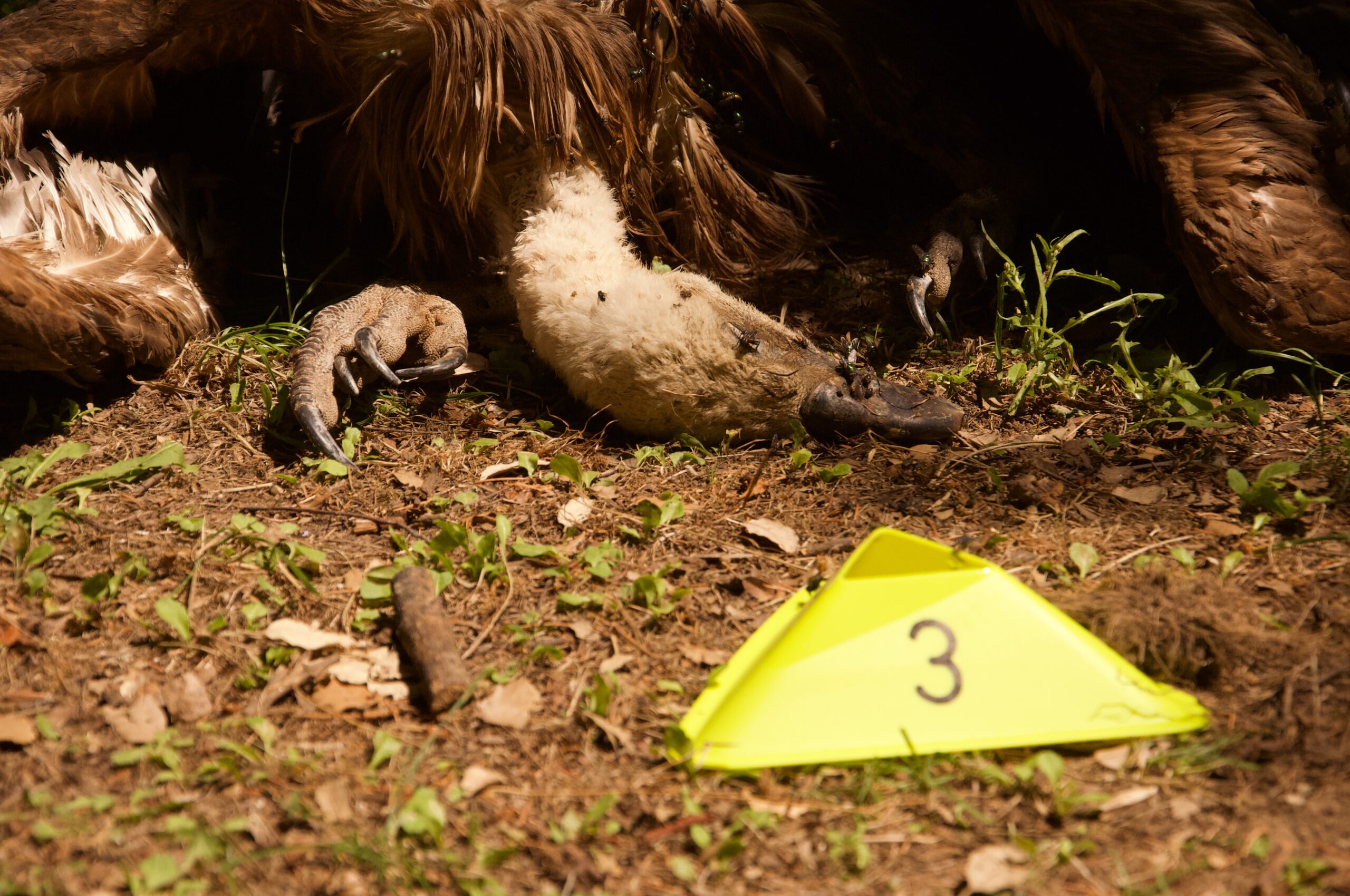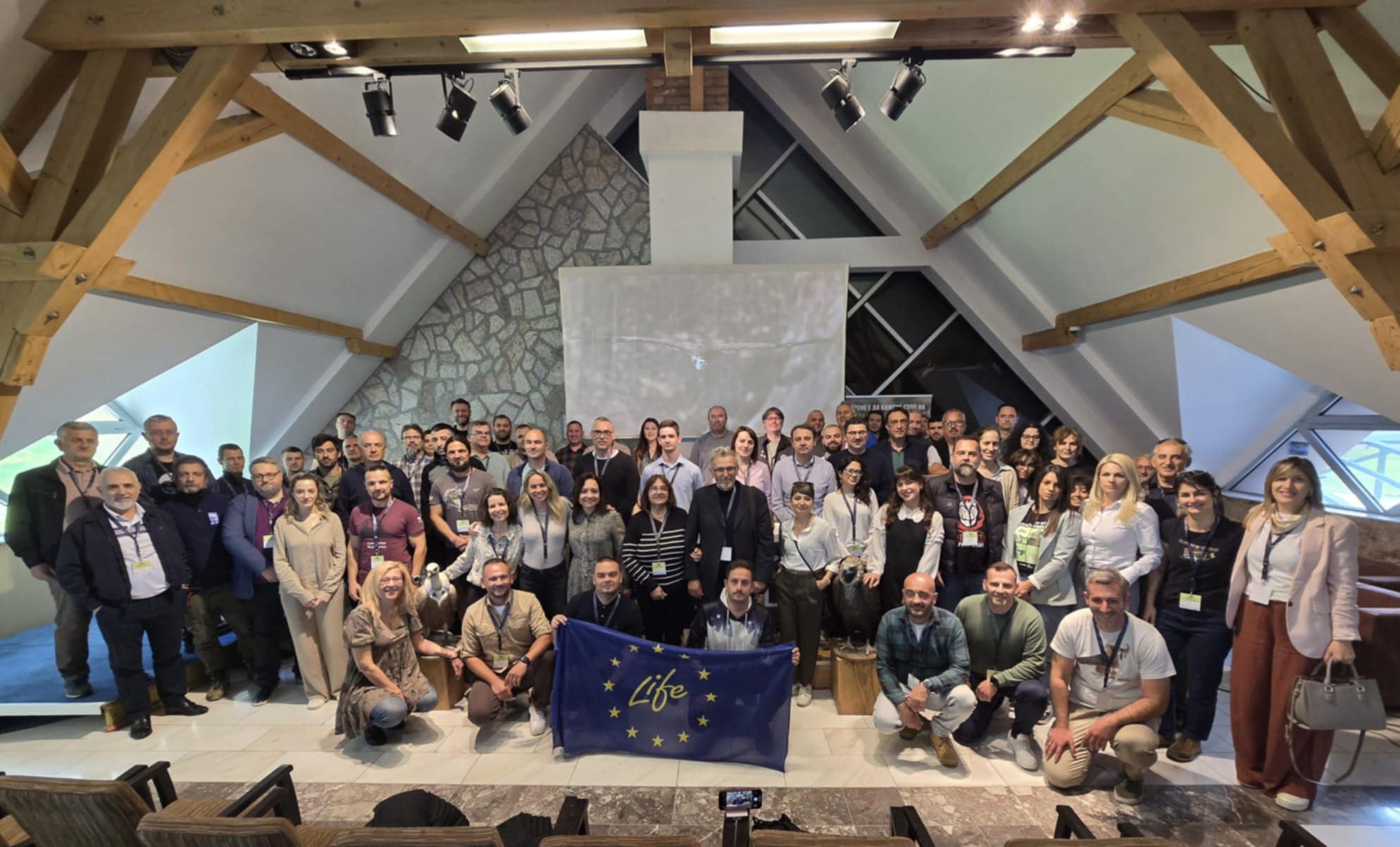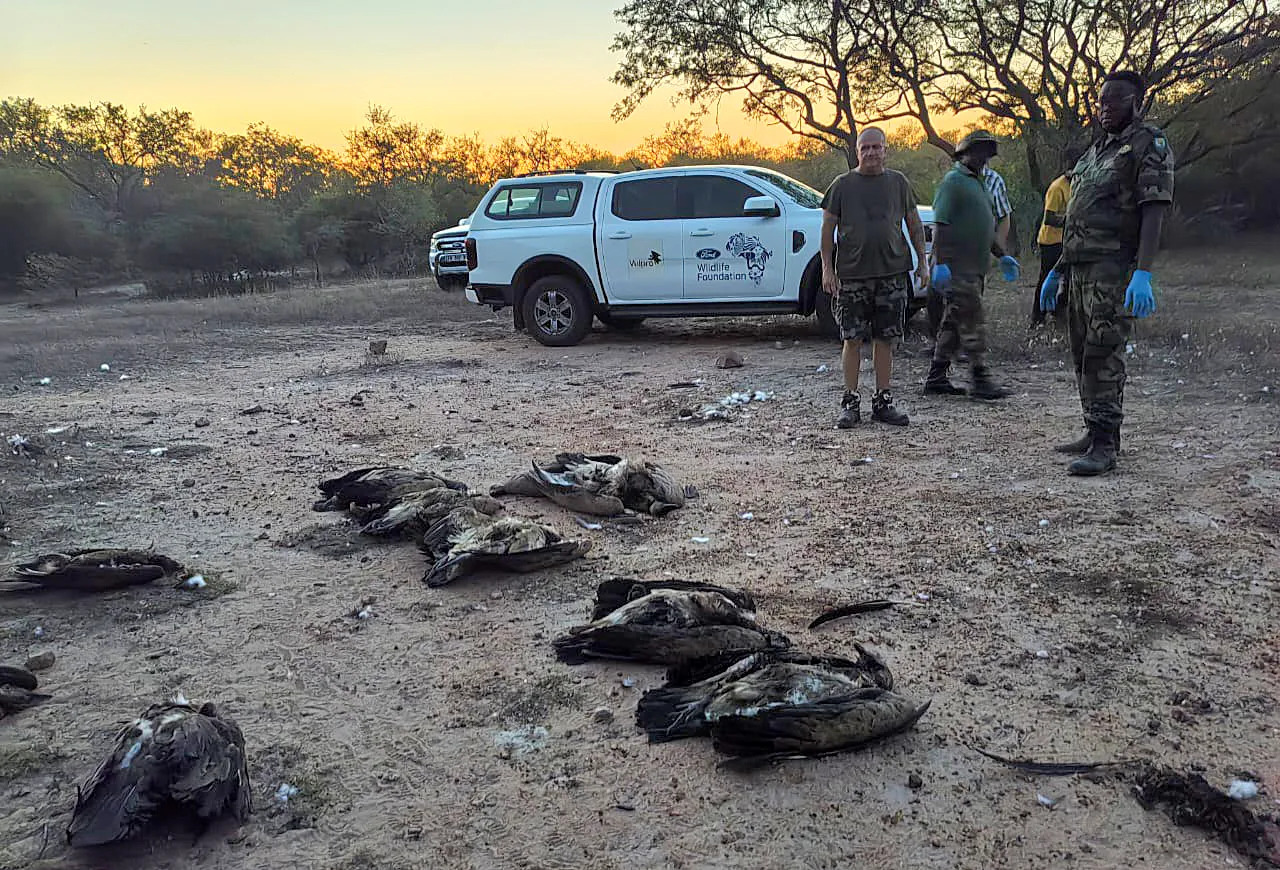
Two adult Egyptian Vultures were found dead in a nest in the International Douro Natural Park, on the border between Portugal and Spain and tests indicate that they were poisoned.
Discovering the birds
The Egyptian vultures were found dead in the nest in late July, during a routine monitoring visit to measure breeding productivity, as part of the LIFE Rupis project, and were collected a few days later by members of the Natural Park /ICNF, supported by Oriolus and by the Portuguese national guard (GNR).
Lab tests on the vultures’ remains – a bunch of feathers and bones – revealed that the birds died because they ingested carbofuran, which could still be detected on the palate of the birds skulls. Carbofuran, an illegal pesticide due to the high levels of toxicity, is classified “very dangerous” by the World Health Organization for human health.

The substance was probably placed in bait spread on the ground to kill wild or feral animals. The same thing is likely to have happened in other cases the project is following. Aside from these cases where poison was illegally used, the project is also following other cases where – intentionally or due to negligence – deaths were caused by pesticides and other toxic substances used legally in agriculture.
“Illegal or negligent use of poisons is one of the biggest threats to many protected species in Portugal and Spain. And it’s not just wildlife that’s at risk: poisons which kill vultures are also dangerous to pets and people,” says Joaquim Teodósio from SPEA (Birdlife in Portugal), who coordinates the Life Rupis project.
“Alongside cases in which the victims were endangered wild animals, in the Life Rupis project we’re also following situations where sheep or dogs belonging to local people were killed, for example.”
Threats to vultures and other raptors
Poisoning has been recognized as the single most important threat that vulture populations are facing worldwide within the Vulture Muti-Species Action Plan, a crucial strategic document for conservation of Old World vultures, approved by the Convention for Migratory Species last year.

The problem of illegal poison use goes well beyond the Douro. Just this year we have heard of vultures being poisoned across Europe – from cinereous vultures poisoned in Greece to the death of released bearded vulture Durzon in France and the case of anEgyptian vulture killed during their migration from Italy by suspected poisoning.
Other raptors are also at risk from poisoning. In the south of Portugal, project LIFE Imperial – which aims to conserve the Spanish Imperial Eagle – has encountered several cases in which this and other endangered species were poisoned. In Spain, the trial is starting on the biggest case of protected species poisoning on record: the killing of almost 200 eagles and other protected birds several years ago. Also in Spain, two men were recently arrested for possession of baits and enough poison – carbofuran, the same substance as in the Douro – to kill hundreds of people.
Working to fight illegal wildlife poisoning
Many projects across Europe are working hard to tackle the threat posed to vultures and wildlife including our own LIFE-funded projects such as, Vultures Back to LIFE and LIFE Re-Vultures.

In the LIFE Rupis project there are two anti-poisoning canine units, comprising an agent and a dog trained to detect poisons. National authorities and park rangers on both sides of the Spain-Portugal border work to identify and investigate these situations, and they also work to prevent further poisoning in the areas with the highest records of poisoning cases in the last few years. Working together, LIFE Rupis partners have implemented protocols to ensure the best possible connection between the various steps in the process, from the agents on the ground to the specialized test labs and courts of law.
Elsewhere in Spain, the Andalusia region has been at the forefront of tackling illegal poisoning launching the first strategy to tackle poisoning in 2004 and since then there has been a significant decrease in the cases of poisoning, some 50 percent, and involves quick investigations of suspected cases, canine anti-poisoning units and patrols, and condemnatory sentences being imposed.
Whilst in the Balkans we have been working across five different Balkan states on the Balkan Anti-Poisoning Project, to bring together wildlife conservation organisations, governmental agencies and other stakeholder such as hunting associations, farmers and scientists, to tackle illegal wildlife poisoning.
Raising awareness of the issue

These deaths of Egyptian vultures feature on a special editition of Frontline, a prime-time TV programme in Portugal, this one called Veneno Selvagem, which will be broadcasted on 15/11/18 at 9pm on Portugese public TV station RTP. The report by Luís Henrique Pereira with photography by Carlos Pinota, João Oliveira, Filipe Valente looks at the incidence of poisoning in Portugal over the last 10 years and the deaths of over 150 animals with special protection status and what it could mean for nature and also public health. The VCF has been interviewed in the programme too!
Working together we can stop incidents like this happening and protect vultures against poisoning.
LIFE Rupis
The LIFE Rupis conservation project, led by Portuguese wildlife organisation Sociedade Portu
guesa para o Estudo das Aves (SPEA), and funded by the European Union’s LIFE Fund and the MAVA Foundation, is working in the cross-border Douro region of Spain and Portugal to protect and strengthen the populations of Egyptian vultures and Bonelli´s eagle. With around 135 breeding pairs, the region has one of the largest population of Egyptian vultures in Europe. Creating a network of feeding stations, improving habitat and nesting sites as well as tackling the major threats of electrocution from electricity pylons and illegal wildlife poisoning, the LIFE Rupis project will strengthen the population and improve breeding rates.
The LIFE RUPIS project is implemented by the VCF and partners, including SPEA (BirdLife in Portugal), ATN and Palombar (regional conservation organisations in NE Portugal), the Junta de Castilla y Leon & the Fundación Patrimonio Natural de Castilla Y León, the Portuguese electricity distributor EDP-D, the Portuguese statutory conservation agency ICNF and the Portuguese environmental police force (GNR), and is co-funded by the MAVA Foundation.
Poison strikes again in the Douro Canyon – press releases Download
Poison strikes again Portugese.pdf Adobe Acrobat Document 187.9 KB Download





